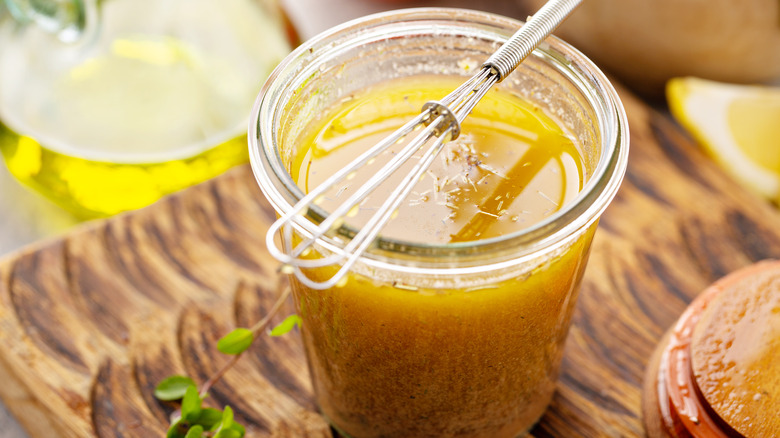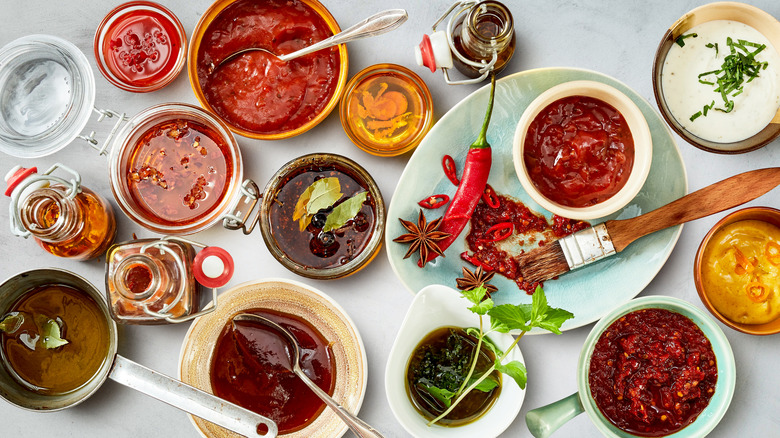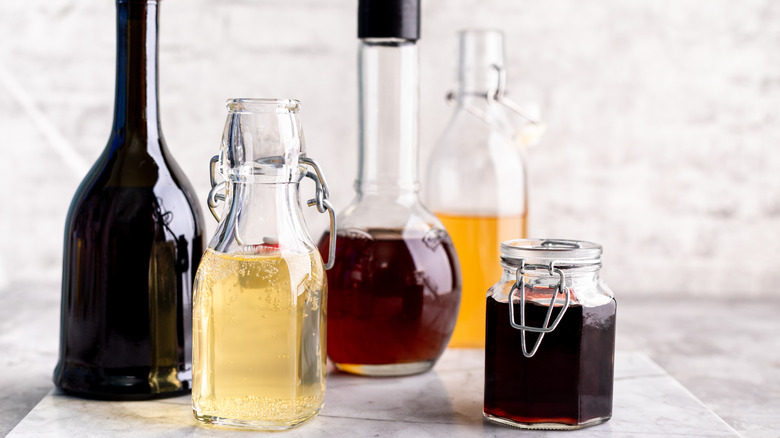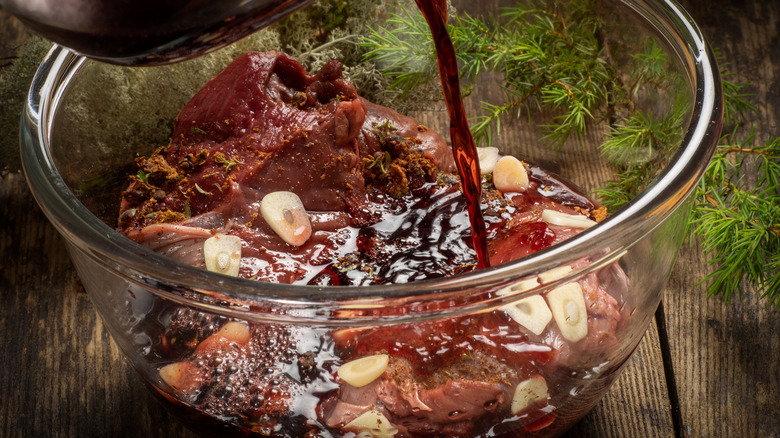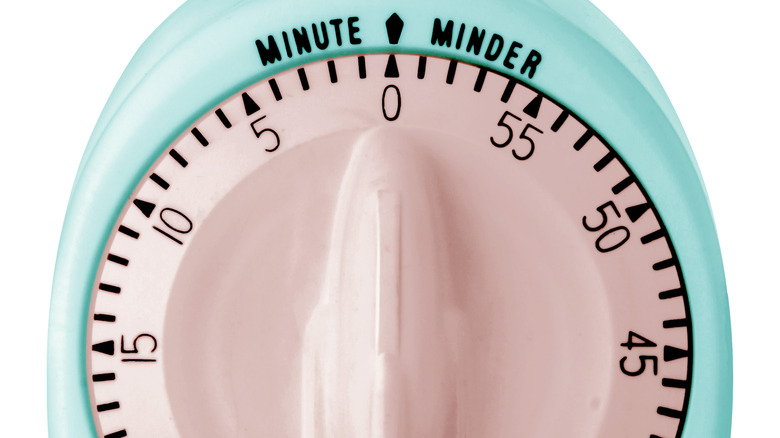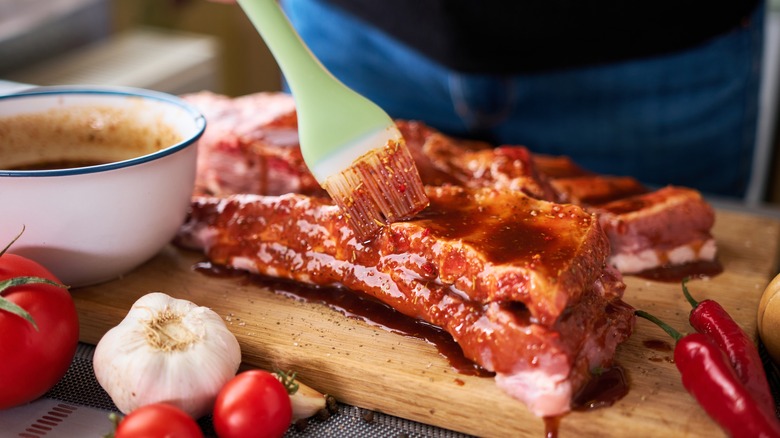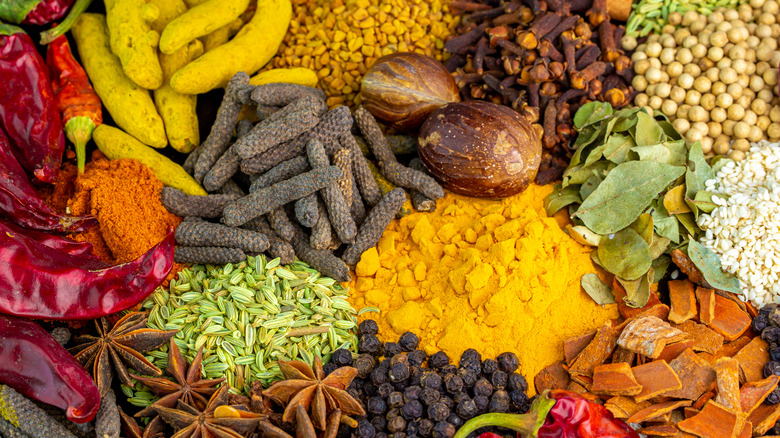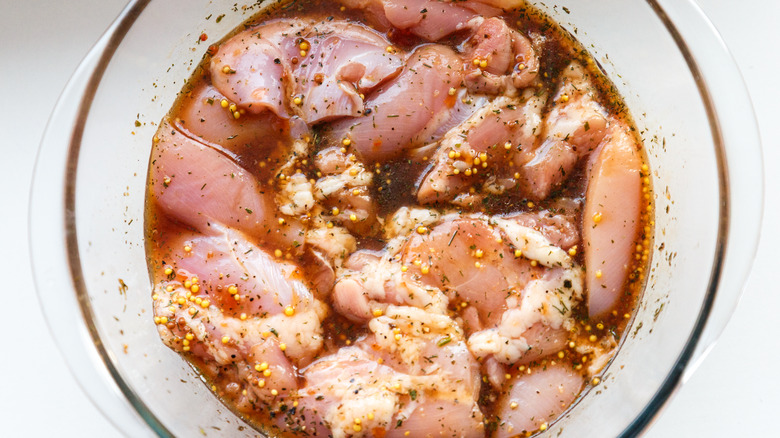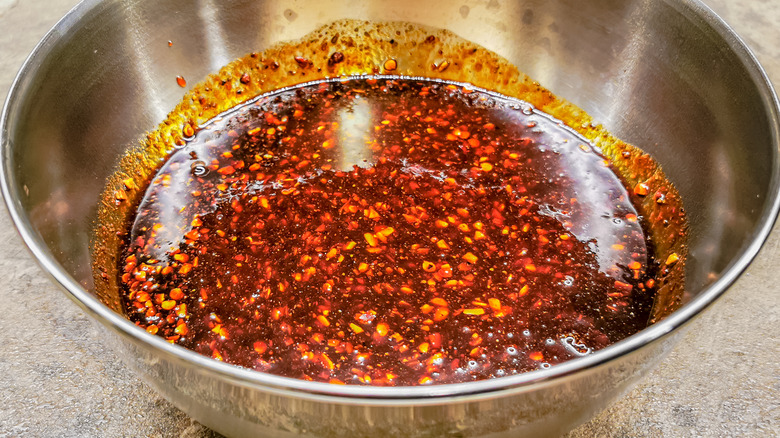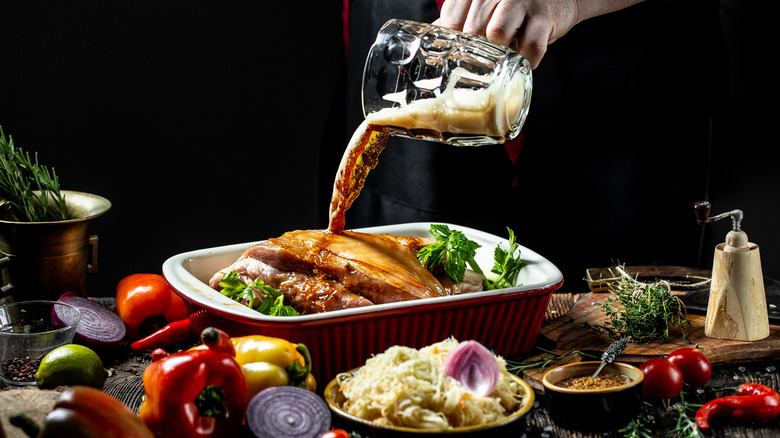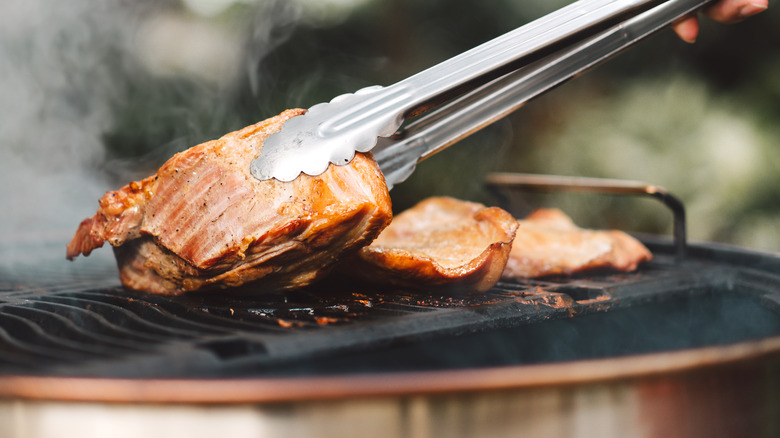Mistakes Everyone Makes With Their Marinades
Whether you want more flavorful chicken, more tender beef, or mushroom caps that can satisfy even dedicated carnivores, marinades are the go-to choice for improving flavor and texture. Contrary to popular belief, marinades don't typically penetrate all the way into the meat or even many vegetables (per Cook's Illustrated). Instead, the magical fusion of acid, fat, and seasonings tends to linger in the outer layers of whatever you're cooking, enhancing the flavor of each bite through deeper seasoning.
But marinade only works if you get it right. When you get it wrong, you can wind up with a dish that's actually a whole lot worse rather than better — if not unsafe to eat all together. And there are a lot of pitfalls that home cooks tend to trip over in their quest for perfect marination. The good news is that most of the time it comes down to one of a few factors. And by knowing the mistakes everyone makes with their marinades, you can avoid the most common catastrophes and make sure all your dishes turn out exactly the way you want.
Using too many ingredients
Marinades are all about intense flavors, but that doesn't mean that a marinade should have every flavor imaginable in it. It can be tempting to put a little bit of this and that in your marinade until you've added half your pantry, but resist! You don't need tons of ingredients to make a great marinade. In fact, a classic marinade only has a few key components, and it's more of a ratio than it is a set quantity. For whatever volume of marinade you want to make you'll need 1 part acid, 3 parts oil, and a smaller proportion of salt, sugar, herbs and spices (via Bertolli).
While some marinades can feature a fairly lengthy, complex list of ingredients, it's a good idea to keep things relatively simple. Spice blends for specific wet marinades like tandoori or jerk chicken make it easy to get the exact components you want without running the risk of adding something that will throw off the flavor. When you're winging it on your own, The Spice House recommends keeping things fairly simple, and thinking about the way that the different flavors in your marinade ingredients will mix together and combine.
Adding too much salt
While salt is an essential ingredient in most marinades, adding too much salt is an easy mistake to make. Overdoing it with the salt in your marinade can leave you with meat that has a rubbery, tough texture on the outside. It can also, unsurprisingly, ruin the flavor balance of whatever you're marinating.
The first step to making sure you don't end up with rubbery food that tastes like a salt lick is to know the difference between a marinade and a brine. As Men's Health explains, a brine is a salt-based solution that is basically salt and water (or some other flavorful liquid like beer, cider, or juice) with optional spices and herbs. Brines typically don't have oils or acids in them, and also tend to contain a larger amount of liquid. Their primary purpose is to impart juiciness on proteins that can dry out when cooked. Marinades, on the other hand, are all about imparting flavor, and are made with a mixture of acid and oil plus a smaller amount of salt and seasonings. Because marinades are much more concentrated, you definitely want to be careful about how much salt you include.
The amount of salt your marinade needs depends on your other marinade ingredients. If you're using salty sauces like soy or worcestershire in your marinade, you'll want to use less table salt. And as Cook's Illustrated points out, soy sauce can even replace regular salt in a marinade.
Making it too acidic
Whether you're marinating vegetables and fruits or meat, too much acid in your mixture can cause a lot of problems, from altering the texture to throwing off the flavor of your finished dish. While marinade doesn't generally penetrate meat very deeply, it can have some significant effects on the outside of your meat. Too much acid without other ingredients to balance it out can leave you with meat that has a mealy or mushy exterior, according to The LA Times' food writer. The vinegar, lemon juice, or other acidic component denatures the proteins on the outside layers of the meat, eventually causing the fibers to break down. And that mushy texture on the outside can cause issues when you're cooking, too. Per The Washington Post, wet, mushy meat is more likely to stick and less likely to brown properly when you cook it.
Seafood also suffers from overly acidic marinades before cooking. While some dishes like ceviche use acid to chemically cook the fish, if you use a highly acidic marinade and then cook your seafood, you're likely to end up with an unappealing, rubbery result. Today's food editor points out that less is more when it comes to seasoning fish and seafood, and that soaking for too long in too acidic a marinade will make for an unpleasant end result.
Reusing a marinade without cooking it
Marinating is a pre-cooking step for the most part, which generally means that your marinade is going to be in contact with raw meat. And even the freshest, highest quality meat has at least some trace amount of bacteria on it. That means that your marinade will contain unfriendly microbes after you've used it to season your protein. Therefore, as Tasting Table points out, the biggest issue with reusing your marinade is that it can cause food poisoning.
Whether you try to use the same marinade on two batches of meat, or try to repurpose the marinade you whipped up as a sauce for your finished dish, the microbes from the raw meat pose a major health risk. Reusing the marinade on more than one batch of uncooked meat increases the amount of microbes in the marinade, which increases the chance it will make you sick. And trying to use the marinade as a sauce on your finished meat also increases that risk because the acid and salt in the marinade may not kill off all the microbes.
However, if you really don't want to waste your marinade, there is one way to safely make it into a sauce. Per the USDA, boiling the marinade before transforming it into a finishing sauce eliminates most of the harmful bacteria. A better option would be to reserve some of your marinade after you make it, so it never comes into contact with raw meat.
Not marinating long enough
Marinade may only penetrate a couple of centimeters into the surface of whatever you're adding to it, but it still takes time to work its magic to the fullest. Not marinating long enough makes for a waste of ingredients, and renders the effort you put into making a marinade pointless. The things is, there's not a hard and fast rule about how long you need to marinate your meat or produce to get the best results. Instead, as What's Cooking America explains, there are a few basic guidelines on the windows of time that give you the flavor you're looking for.
The amount of time your marinade will need to give you the tasty results you want depends a lot on what you're marinating, as well as what's in your recipe. A highly acidic marinade should only be in contact with meat for a relatively short period of time, while a marinade that has more oil or fat can soak into the meat for longer without doing harm (via HuffPost). If you're working with a big, unwieldy piece of meat, like a pork roast or a whole turkey or chicken, you'll want to give your marinade plenty of time to do its work — even up to a day. But for smaller, thinner pieces of meat or fish, give it at least 15 to 30 minutes to get the job done.
Or marinating for too long
Just like it's a waste of effort to marinate your food if you don't have enough time for it to soak up any of the flavor, keeping your meat or produce in a marinade for too long can cause problems as well. The danger of marinating for too long is twofold — the acids in your mixture can impact the texture of whatever you're marinating over time, and the flavor can intensify in a way that overpowers what should be the star of your meal.
As the USDA explains, marinating meat for up to 24 hours doesn't pose a terrible problem in most cases. Of course, this can vary a little bit depending on the protein in question. For example, you definitely don't want to marinate most seafood for a day, and thinner cuts of lean meat can also suffer breakdown more quickly than larger cuts. But in general, after a full day or two of sittign in a marinade, you run the risk of ruining the meat's exterior texture, which will almost certainly impact your enjoyment after all that effort.
From a flavor perspective, although marinades don't penetrate very deeply into meat, the outer layer that soaks up all the juicy seasonings can become too saturated. This can make your finished product taste too acidic, too salty, or make the flavors feel imbalanced (via The New York Times).
Not using enough marinade
At heart, marinades are simply a type of seasoning. Whether you're working with meat, seafood, tofu, fruits or vegetables, the goal of a marinade is to create a layer of flavor on the surface of your food. In order to do that, you need to make sure you have enough marinade to get the job done.
According to Cook's Info, the general rule is to make at least half a cup of marinade for every pound of meat, to ensure that the marinade fully coats all sides of whatever you're cooking. This is especially important because, ideally, the marinade is the only seasoning your meat is going to receive. As long as your marinade ratio is in balance, a thick and even coating of the sauce provides an even layer of flavor and prevents blandness.
If you're not sure whether you have enough of your marinade ingredients to thoroughly coat whatever you're marinating, you can tweak your recipe with alternate components. Without enough marinade, however, you'll end up with uneven seasoning and potentially flavorless chunks of food in your finished dish.
Using the wrong seasonings
The question of what seasonings you should use in your marinade is a key one. It's all a question of balance and understanding your marinade. There are a lot of options out there, and the wrong combination can lead to weird flavors and other issues. And it's worth noting that some spices just don't play well with the high acid environment of a marinade. Garlic powder, for example, can be a very tricky ingredient when you're marinating (via Tasting Table). Garlic powder cooks up differently than fresh garlic, and the acidic ingredients in a marinade don't let dehydrated garlic shine as much.
When you choose your seasoning components, it's a good idea to understand at least a little about how dried herbs versus fresh will interact with the rest of your marinade. Dry herbs that come from woody plants like oregano, rosemary, thyme, and sage tend to retain their flavor better after drying, while softer herbs, such as parsley, chives, and basil work better when fresh, according to America's Test Kitchen.
The length of time you marinate your food and the cooking method you plan to use will also play a role in choosing the right seasonings. If you're marinating for a long time, dried herbs will have enough of an opportunity to hydrate and infuse the marinade with flavor, while fresh herbs might take on some odd flavors from the prolonged oxidation.
Ignoring the temperature danger zone
One of the key tenets of food safety is avoiding the temperature danger zone, which the USDA defines as the range between 40 degrees and 140 degrees Fahrenheit. This temperature range is ideal for bacteria that live in and on your food, leading to the growth of microbes, like salmonella and e.coli, which can make you sick. If you're marinating something for a very short time, say 15 or 20 minutes, it's not as much of an issue to leave it out at room temperature while your food soaks up the tasty flavor. However, if you're marinating your meat for hours or overnight, it runs a high risk of entering the danger zone if not handled properly.
You should always keep long-marinating items chilled to make sure that the temperature doesn't rise above 40 degrees Fahrenheit. The easiest way for most people to avoid the temperature danger zone while marinating is to keep the food in a sealed or covered container in the fridge (via The Academy of Nutrition and Dietetics). You can also use a cooler with some ice to maintain the right temperature. But be sure to check in on your food every so often to make sure the ice hasn't melted and that the temperature inside the cooler hasn't gone up dangerously.
Ignoring other food safety issues
The temperature danger zone isn't the only food safety issue that home cooks run into when marinating. Other concerns, like cross-contamination, come up frequently, and can lead to illness just as much as crossing the 40 degree-threshold does. To make sure your marinating food won't turn up to haunt you later in the week due to cross-contamination, stick with glass or plastic containers, or put plastic bags in a bowl to ensure leaks will stay contained. Also make sure you wash your hands before and after touching raw meat, and thoroughly wash anything the raw meat comes into contact with (via USDA).
Leaks aside, choosing the right container to marinate your food in is important. While metal bowls and containers are good for a lot of things, and certainly don't have a tendency to leak, they're not a good idea for marinating. Marinades typically contain a lot of acid, which can interact with metal containers drastically (via Utah State University). Over time, the acid leaches metal, which can lead to unpleasant flavors in your finished dish, as well as to damage to the container itself .
Not matching your marinade to your protein
Not all flavor combinations work together as well as others. And randomly throwing together seasonings with meats or vegetables can lead to offputting results. If you've ever put mint in something you meant to add basil to, you've experienced that first hand. But beyond the most obvious unpalatable or unpleasant pairings, it's easy to make a mistake when trying to get original with your marinades. Fortunately, there's a whole science behind pairing foods based on flavor, aroma, and texture, and it's not difficult to learn (via Popular Science).
If you don't want to take the time to learn everything there is to know, just understand that certain spices and herbs work better with certain meats and vegetables. The basic key to keep in mind is that darker meats and more intensely flavored vegetables tend to work better with bold seasonings and vice versa (via Spices Inc.). Coffee and chocolate might overwhelm your chicken recipe, but they are fabulous with beef. On the other hand, light seasonings like tarragon and chives can get lost when you pair them with a heavier meat, like beef or lamb, but they add a delicate, intriguing flavor to chicken and fish. There are a lot of classic combinations out there, so it doesn't take a massive spice cabinet to get maximum flavor from what you cook.
Using the wrong cooking method with your marinade
Just like it's important to pair the right seasonings to your protein, it's also important to consider how you'll be cooking your meat or vegetables when choosing a marinade recipe. Not all marinades play equally well with all cooking methods, and making a bad choice can result in a number of different issues.
For example, as the The Seattle Times notes, cooking lemon for too long makes it bitter. And it's fair to say most people don't want their grilled chicken to taste like medicine. Another issue that can come up with mismatched marinades and cooking methods is burning, which can happen when sugary ingredients meet high heat. Brown sugar, molasses, honey, and other sweet counterparts to acids in marinades can burn when you grill with them. BBQ Hall of Famer Meathead Goldwyn recommends only using sugar when you're going to cook your protein over low, slow heat. And speaking of high heat-marinade mishaps, oily mixtures can cause flare-ups on the grill, burning the exterior of your meat, per BBQ Champs Academy. And if you want to bring a boozy flavor to your food, marinating it in wine is a great choice. But the cooking method matters here, too. Wine marinades work best when paired with wet, slow cooking methods, like braising (per Alcohol Professor).
By making sure you pair your marinade style to the cooking method, you can avoid major kitchen nightmares and keep your food delicious at the same time.
